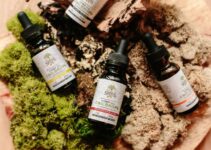As someone who's been on the quest for natural anxiety relief, decoding the chemical composition of CBD oil has been a game-changer. Unraveling the mysteries of cannabidiol (CBD) versus tetrahydrocannabinol (THC), the aromatics and therapeutic effects of terpenes, and the impact of phytocannabinoids on the endocannabinoid system has opened up a world of potential benefits. Let's dive into the fascinating world of CBD oil and its potential for anxiety relief.
Key Takeaways
- CBD oil has a distinct chemical composition with CBD and THC having different properties.
- Terpenes in CBD oil, such as myrcene, linalool, and limonene, possess calming properties and can aid in anxiety relief through aromatherapy benefits.
- Phytocannabinoids in CBD oil interact with the endocannabinoid system and have potential therapeutic effects for anxiety relief.
- Flavonoids in CBD oil offer potential benefits for anxiety relief, promoting sleep quality, reducing stress, and exhibiting antioxidant and anti-inflammatory properties.
Cannabidiol (Cbd) Vs. Tetrahydrocannabinol (Thc)
The cannabidiol (CBD) and tetrahydrocannabinol (THC) in CBD oil have distinct chemical compositions that impact their effects on anxiety relief. CBD is known for its potential in pain management, making it a promising option for those seeking relief from anxiety without the psychoactive effects associated with THC. On the other hand, THC has been linked to appetite stimulation, which can be beneficial for individuals experiencing anxiety-related loss of appetite. When it comes to sleep disturbances, CBD has shown promise for insomnia, offering a potential avenue for anxiety relief by promoting better sleep. Transitioning into the subsequent section about 'terpenes: aromatics and therapeutic effects', it's essential to understand how these compounds interact to provide holistic benefits for anxiety management and overall well-being.
Terpenes: Aromatics and Therapeutic Effects
When exploring the therapeutic effects of terpenes in CBD oil for anxiety relief, I have found that these aromatic compounds play a crucial role in enhancing the overall experience and potential benefits. Terpenes not only contribute to the aroma and flavor of CBD oil but also offer therapeutic aromatics that can have a positive impact on anxiety. Through aromatherapy benefits, terpenes such as myrcene, linalool, and limonene are known to possess calming and soothing properties, which can aid in anxiety relief. Below is a table highlighting the therapeutic effects of select terpenes commonly found in CBD oil:
| Terpene | Aromatherapy Benefits |
|---|---|
| Myrcene | Sedative, relaxing |
| Linalool | Calming, stress-relief |
| Limonene | Uplifting, mood-enhancing |
| Pinene | Alertness, mental clarity |
Understanding the therapeutic potential of terpenes is essential for maximizing the anxiety-relieving properties of CBD oil.
Transitioning to the subsequent section about 'phytocannabinoids: impact on endocannabinoid system', it is crucial to delve into how these compounds interact with the body's natural regulatory system.
Phytocannabinoids: Impact on Endocannabinoid System
Exploring how phytocannabinoids impact the endocannabinoid system reveals their crucial role in regulating various physiological processes. Phytocannabinoids, such as CBD and THC, interact with the endocannabinoid system, which is responsible for maintaining homeostasis in the body. These compounds mimic the effects of endocannabinoids, influencing the communication within the endocannabinoid system. By doing so, phytocannabinoids can modulate processes like pain perception, mood, appetite, and memory. Additionally, they can also influence immune responses and inflammatory pathways. Understanding the impact of phytocannabinoids on the endocannabinoid system provides insights into their potential therapeutic effects, particularly for anxiety relief. Transitioning into the subsequent section about 'flavonoids: potential benefits for anxiety', it becomes clear that the chemical composition of CBD oil encompasses various compounds that collectively contribute to its potential for anxiety relief.
Flavonoids: Potential Benefits for Anxiety
I've come across some fascinating research on flavonoids and their potential benefits for anxiety relief. It's intriguing to see the impact that flavonoids, the natural compounds found in plants, can have on our mental well-being. I'm excited to share some key points about the link between flavonoids and anxiety relief.
Flavonoids and Anxiety Relief
Flavonoids in CBD oil offer potential benefits for anxiety relief. Research suggests that flavonoids play a crucial role in promoting sleep quality, which is essential for managing anxiety. Flavonoids have been found to interact with neurotransmitters in the brain, such as GABA, which can help in reducing stress and promoting relaxation. These compounds also exhibit anti-inflammatory properties that can contribute to overall stress management. Understanding the potential of flavonoids in alleviating anxiety is crucial for developing effective CBD oil products for anxiety relief. As we delve further into the impact of flavonoids, it becomes evident that these compounds hold significant promise in addressing anxiety and its related symptoms.
Impact of Flavonoids
In my research on CBD oil's chemical composition for anxiety relief, I discovered potential benefits of flavonoids for alleviating anxiety. Flavonoids, commonly found in plants, have been linked to stress relief and mental health improvement. Here are some key points about the impact of flavonoids:
- Antioxidant Properties: Flavonoids exhibit strong antioxidant effects, which can help in reducing oxidative stress and inflammation, contributing to overall mental well-being.
- Neuroprotective Effects: Studies suggest that flavonoids may have neuroprotective properties, potentially safeguarding against cognitive decline and promoting brain health.
- Mood Enhancement: Some evidence indicates that flavonoids could positively influence mood and emotional states, offering potential benefits for anxiety management.
- Stress Reduction: Flavonoids have been associated with stress reduction, potentially aiding in lowering anxiety levels and promoting relaxation.
These findings highlight the promising role of flavonoids in addressing anxiety and supporting mental health.
Essential Fatty Acids: Omega-3 and Omega-6 Content
When it comes to anxiety relief, understanding the role of essential fatty acids like omega-3 and omega-6 is crucial. Omega-3 fatty acids have been linked to potential benefits for anxiety, while maintaining a proper balance of omega-6 levels is also important. Let's explore the specific ways in which these essential fatty acids contribute to anxiety relief and overall well-being.
Omega-3 Benefits for Anxiety
Exploring the benefits of omega-3 for anxiety relief has been an eye-opening journey for me. I've discovered that incorporating omega-3 rich sources like fatty fish, flaxseeds, and walnuts into my diet has positively impacted my anxiety levels. Additionally, I've realized that omega-3 fatty acids play a crucial role in brain function and can help in managing anxiety symptoms. Regular consumption of omega-3 has also been linked to reduced inflammation, which is often associated with anxiety disorders. Furthermore, I've found that combining omega-3 intake with anxiety management techniques such as exercise and mindfulness has enhanced the overall effectiveness in alleviating anxiety. Understanding the impact of omega-3 on anxiety has truly been enlightening, but it's also important to consider the balance of omega-6 levels for optimal results.
Balancing Omega-6 Levels
I've found that maintaining a balance between omega-3 and omega-6 levels is crucial for overall well-being and anxiety management. Omega-6 fatty acids are essential for the body, but an excessive intake can lead to inflammation and may contribute to anxiety. It's important to consume omega-6 and omega-3 fatty acids in the right proportions to support a healthy inflammatory response and promote overall wellness. Some dietary sources of omega-6 fatty acids include oils such as corn, soybean, and sunflower oil, as well as nuts and seeds. Balancing omega-6 levels with omega-3 intake from sources like fatty fish, flaxseeds, and walnuts can help manage anxiety and support a healthy mind and body.
```markdown
| Omega-6 Fatty Acid Sources |
|---|
| Corn oil |
| Soybean oil |
| Sunflower oil |
| Nuts and seeds |
```
Other Phytochemicals: Antioxidants and Anti-Inflammatory Properties
The CBD oil contains various phytochemicals that exhibit antioxidants and anti-inflammatory properties, which contribute to its potential for anxiety relief. These phytochemicals play a crucial role in promoting overall well-being and mental health. Some of the key phytochemicals in CBD oil include:
- Cannabigerol (CBG): Known for its antioxidant properties, CBG helps in reducing oxidative stress and inflammation, thus contributing to anxiety relief.
- Terpenes: These compounds have anti-inflammatory effects, potentially aiding in alleviating symptoms of anxiety.
- Flavonoids: With their antioxidant properties, flavonoids may help in protecting the brain from oxidative damage, potentially reducing anxiety.
- Phenolic compounds: These compounds possess strong antioxidant properties, which may play a role in mitigating anxiety symptoms.
These phytochemicals work synergistically to enhance the therapeutic potential of CBD oil for anxiety relief.
Frequently Asked Questions
Can CBD Oil Be Used as a Substitute for Prescription Anxiety Medications?
Yes, CBD oil can be an alternative to prescription anxiety medications. I've found it effective in my anxiety management strategies. It's important to consult with a healthcare professional to determine the best approach for you.
How Does CBD Oil Interact With Other Medications or Supplements?
Like a delicate dance, CBD oil interactions with medications or supplements require caution. Safety precautions are vital to ensure efficacy and avoid adverse effects. Long-term use should be approached with awareness of potential interactions.
What Is the Recommended Dosage of CBD Oil for Anxiety Relief?
I find the recommended dosage for CBD oil varies depending on the individual's needs. It's important to start with a low dose and gradually increase to find the most effective amount for anxiety relief.
Are There Any Potential Side Effects of Using CBD Oil for Anxiety?
Using CBD oil for anxiety may have potential risks, such as dry mouth and drowsiness. Long-term effects are still being researched. It's important to consult a healthcare professional before starting any new supplement.
Can CBD Oil Cause a Person to Feel "High" Like Thc?
CBD oil does not cause a person to feel "high" like THC. It lacks the psychoactive effects of THC, so there's no intoxication risk. It's important to note the distinction between the two compounds.
Conclusion
In conclusion, CBD oil is like a diverse garden, filled with different plants and flowers, each with its own unique benefits. From the calming effects of terpenes to the balancing impact of phytocannabinoids, and the soothing properties of flavonoids, CBD oil offers a rich array of chemical compounds for anxiety relief. Just like a garden, the chemical composition of CBD oil works together in harmony to provide a natural and holistic approach to managing anxiety.





